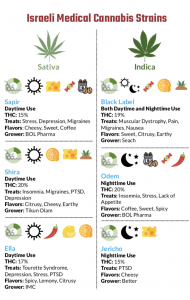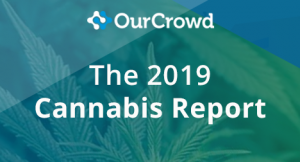As the rest of the world catches on to the positive impact of medical marijuana, Israel is ready to hit ‘go’ on CannabisTech – and impact lives around the world.
Israel recently joined the ranks of a very small global club. It is now only the third country in the world to legally export medical-grade cannabis, joining Canada and the Netherlands. Finalized in January 2019, the new law unlocks a potential billion-dollar industry for Israel annually, not to mention a global market valued to reach $56 billion by 2025, according to a market forecast from Grand View Research.
Download OurCrowd’s 2019 Cannabis Industry Report
Historically the research of cannabis in the United States, and globally, has been limited due to its categorization as a Schedule 1 narcotic (alongside the likes of heroin and ecstasy).
The Ministry of Health in Israel, on the other hand, has been researching cannabis since the 1960’s and monitoring medical cannabis since 2001, making it one of the first countries to do so. As a result, it has played a starring role in the rise of medical cannabis. Hardly a novelty, the use of cannabis is common for both physical and psychological illnesses. The army has used THC to treat soldiers with PTSD and Israelis have long been convinced of the benefits of cannabis. Over 27% of the population aged 18- 65 consumed the drug in 2017, the highest rate in the world by a margin of 9%.
While innovation in the field is not new in Israel, the recent legalization of export is expected to spur an exponential rise in CannabisTech startups in Israel. With a significant boom projected in the industry, many companies are clamoring to get into research and technology for the advancement of growing and specification of the plant for prescription use. Israel is leading the way, with medical cannabis approved for nearly two decades, world class R&D with backing from the Ministry of Health and a strong biotech and startup ecosystem. It is becoming the destination for companies seeking a stake in the future of medicine.
Pioneering cannabis research

A shift in public opinion
The upward trend in legalization is not just for notoriously liberal Canada anymore. Many states in the US are reexamining their relationship to cannabis, recognizing the medicinal benefits of the flower in a variety of ails.
This has not always been the case.
As the leading economy in the world, US policies have often determined global response. But in the last decade, states have begun to decriminalize and approve the use of cannabis in some form. This tide shift may be in part due to public opinion. Over the years, support for legalization has gone from 25% in 1995 to 64% in 2017, according to Gallup polls. By 2018, a Quinnipiac University poll found a stunning 93% approval rate for medical cannabis legalization.
That said, the role of the opioid crisis cannot be ignored. As a result, cannabis is being looked at as an “exit drug” for powerful addictions like prescription pain relievers, fentanyl and even heroin. High death tolls are motivating the medical community to step away from them for fear of abuse. The economic burden of the crisis is now being estimated by the CDC at $78.5 billion a year. States that have legalized medical cannabis are being monitored for its affects on the number of opioids prescribed. In a promising study following 2,897 patients with medical cannabis prescriptions, 68% said they successfully substituted it for opioids.
The world catches up
While not explicitly a pain management drug, medical marijuana is proven to help with conditions like epilepsy, multiple sclerosis and nausea from cancer treatment. In Thailand it was long used as a pain-relieving herb before it was banned. The unanimous 2018 vote for legalization is a welcome return to ancient practice. Even South Korea, a deeply conservative culture, approved medicinal uses. These recent legalizations have brought the number of countries where medical marijuana has been approved to over 30, contributing to the upward market predictions.
Still, all eyes currently rest on the World Health Organization (WHO) for a full recasting of a recreational drug into a medical miracle. The long awaited “Critical Review” from the WHO’s Expert Committee on Drug Dependence was finally released in part last year. The findings allowed for more leniency, particularly for CBD. It also removed cannabis as a Schedule IV drug, which is a step in the right direction for such an austere body. Europe has been the most progressive when it comes to the parameters of legalization, with a potential EU vote in the works. The medical world has yet to fully embrace the marijuana trend, however, for fear of liability and the lack of research on its side effects. Still, hearts and minds are changing, and research is badly needed in this budding industry.
Patients influence drug laws
Cultural and legal shifts in legitimizing marijuana use is being led by patients who have first-hand experience with its benefits. With social media as the vessel, heart-wrenching stories are actively shared, changing conceptions about cannabis. Many of these patients and their families are becoming lobbyists for the drug. Potential patients are also more willing to try medical cannabis. In Germany in 2017, there was a jump in users from a few hundred to over 15,000, partially because of a 2016 supreme court decision that made getting a prescription easier. Numbers across Europe are expected to grow as soon as insurance reimbursement and legal regulations are set.
Garnering investments
The infrastructure is in place for Israel to be an international research center on marijuana, with respected universities, government backing and a robust biotech ecosystem. More than 500 companies applied for licenses after the January export law passed. There are currently 110 active research studies in Israel, with much more to come. About 50 American companies set up R&D centers in the country, and $250 million was invested in the Israeli cannabis industry in 2018.
The Startup Nation grows
Most Israeli tech companies are focused on growing the plant, with a handful of companies making up the majority of the market. Despite relative lack of funding until now, CannabisTech produced 68 companies, with 10 new ones annually. An IVC report found that most were early stage companies focused on processing to delivery, storage and IoT.
From 2013 to 2017, only $76.4 million was invested into these startups, creating a lean field employing around 900 people. Yet the quality and innovation are remarkable. With many R&D headquarters headed to Israel, and the attention it is receiving as a potential exporter, there is a real opportunity to jump forward — and investors recognize it. Recently, OurCrowd partnered with the 7thirty Opportunity Fund from Boulder, Colorado, to create a $30 million fund for cannabis related MedTech, AgriTech, retail, e-commerce, marketplace, SaaS solutions and DeepTech.
Syqe Medical recently raised a $50 million round. The product, already in use at certain Israeli hospitals, is an inhaler which can accurately control patient dosages. The vaporizer is a major milestone towards transitioning medical cannabis from an inexact drug to a prescribed medication; physicians may be able to adjust dosage remotely with these “smart inhalers.” Another company, BOL Pharma, is an Israeli-based medical cannabis company poised to become a global leader. BOL Pharma has been creating vertically integrated cannabinoid therapeutics operations to remedy the main challenges medical cannabis faces (lack of research, inconsistency of cannabis products). The company is unique in that it owns its entire supply chain — from cultivation, to a robust pipeline of clinical trials as well as extraction and production. Plus, it is in full compliance with the strictest standards (GAP, GMP) and certification by Israel’s Ministry of Health. The company controls a vast part of the Israeli market under the new regulation and has one of the largest cannabis production capacities globally.
The future is green.
Market predictors indicate a major boom ahead. Technology will transform the industry by legitimizing it through accurate and precise dispensing while also industrializing through growing and processing breakthroughs. Israel is an ecosystem ripe for cash infusions to push R&D above and beyond. At OurCrowd, we continue to invest in companies like EdenShield and Syqe Medical, and create opportunities for funders, like the 7thirty Opportunity Fund, to be part of the impact this industry will soon have on the world stage.
Download OurCrowd’s 2019 Cannabis Industry Report
About the Author
Kfir Kachlon, Investments Principal, CannabisTech Lead at OurCrowd









